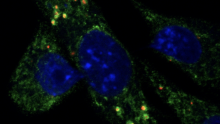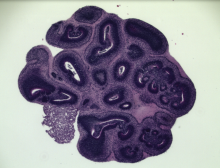Localized radiation therapy against a tumor can trigger a beneficial immune response throughout the body by releasing DNA from mitochondria into the cytoplasm of tumor cells. The findings suggest a new strategy for boosting this response, which may significantly increase the effectiveness of radiation against certain cancers.


A Conversation with Pinkal Desai, M.D.
July 28, 2020
We are pleased to introduce our newest EIPM Member Pinkal Desai, M.D.
Dr. Desai is an Assistant Professor of Medicine in the WCM Hematology and Medical Oncology Department and is the Charles, Lillian, and Betty Neuwirth Clinical Scholar in Oncology, and Clinical Director of the EIPM Molecular Aging Institute.
We hope you enjoy learning more about her research interests.
Q: Can you please tell our readers about your work?

EIPM's Q2 2020 External Newsletter
July 1, 2020
July 2020,
Dear Friends of the EIPM,
Thank you for signing up on our website to receive this quarterly newsletter, I'm thrilled to share news about the important advances we're making in research and efforts to bring more effective treatments to patients during these extraordinary times.

'Mini Brain' Models Study Tumors & Treatments
June 23, 2020
A new technique that involves growing brain tumors in a miniature laboratory model of the human brain recreated the complex genetics of the disease better than other approaches, according to research by investigators at Weill Cornell Medicine and NewYork-Presbyterian. The findings suggest that the technique may provide scientists with a more powerful way to develop and test personalized treatments for these tumors, known as glioblastomas.

A Conversation with Dr. Ravi Sharaf
June 3, 2020
We hope you enjoy the following conversation with EIPM Member Dr. Ravi Sharaf.
Ravi Sharaf, M.D., M.S., is a Member of the Englander Institute for Precision Medicine, an Associate Professor of Medicine (Gastroenterology) with a secondary appointment as Associate Professor of Population Health Sciences (Epidemiology).

EIPM's Clinical Director Cora Sternberg, M.D. on PROSPER Trial
May 29, 2020
A drug that blocks a male hormone receptor prolonged life by nearly a year compared with the placebo in men with nonmetastatic, castration-resistant prostate cancer, according to the final analysis of the results of an international, multi-center Phase 3 clinical trial led by Weill Cornell Medicine and NewYork-Presbyterian investigators.

A Conversation with Princesca Dorsaint
May 7, 2020
Princesca Dorsaint is a Bioinformatics Analyst at the Englander Institute for Precision Medicine. She was born and raised in New York, and received her undergraduate degree in Health Science from The University of Hartford, and then later pursued a second undergraduate degree in Biomedical Informatics from The New York City College of Technology. She has been at Weill Cornell Medicine for a year and a half.
We hope you enjoy learning more about Princesca, her career goals, and how she’s staying healthy during the global pandemic.

Treating Cancer Patients Amid the Pandemic
April 24, 2020
A diagnosis of cancer is one of the most frightening things a patient could ever receive . Despite great advances made in treatment, early detection, and prevention, patients will often feel vulnerable and lost in a maze of the unknown. And now, in the face of the ongoing coronavirus pandemic, every one of us — the healthy and those with health ailments — also feels vulnerable.

Macaulay Students to Assist With COVID-19 Effort
April 10, 2020
Interns in the Englander Institute for Precision Medicine at Weill Cornell Medicine/RLab internship program will work on a tool to identify areas in the US where COVID-19 symptoms are emerging.
Macaulay Honors College today announced a plan for student interns in the college’s RLab program to be redeployed to assist in a national COVID-19 monitoring effort.

EIPM Launches Weekly News Roundup!
April 10, 2020
During normal times it can be difficult to find reliable and accurate news about health, medicine and science. But during a global pandemic, when information can directly affect our lives and our work, this challenge takes on far greater significance.

